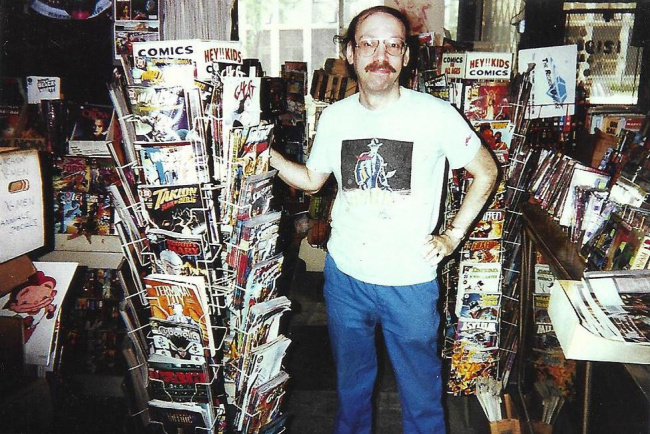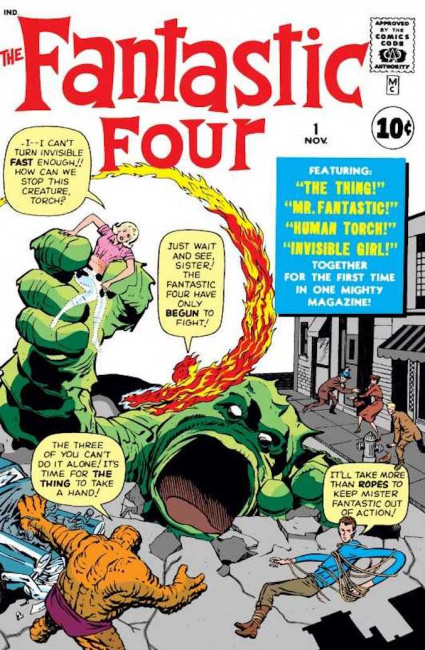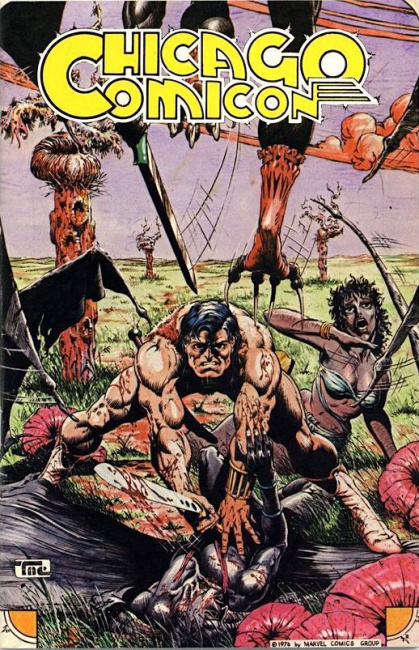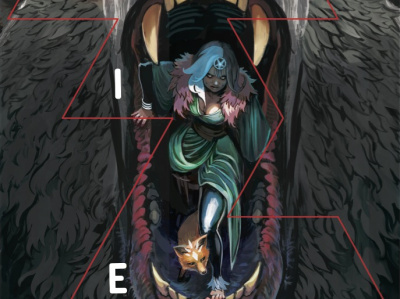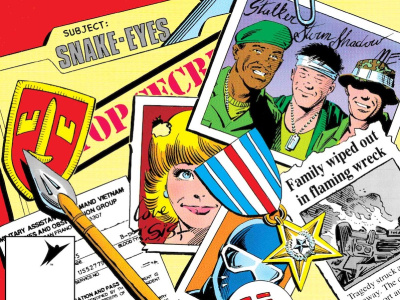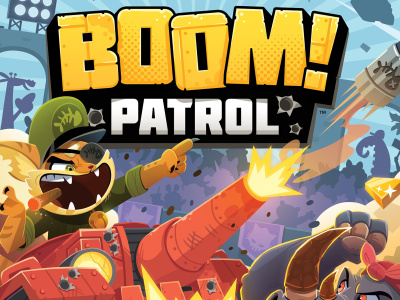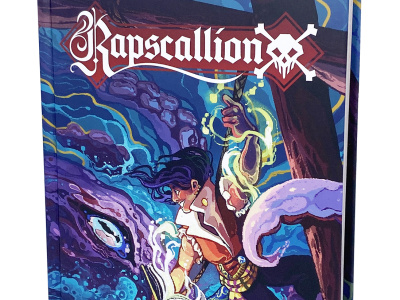Larry Charet has been selling comics, in one way or another, for over 50 years. A comics fan from childhood, he served in Vietnam and, when he returned home, used the money he saved to open up a bookstore/comics shop in 1972. His business flourished not only because of the advent of the Direct Market but also because Charet was adept at staying on top of the newest trends, so his store carried things that couldn’t be found anywhere else. He was also the co-founder of Chicago Comicon, which was sold to Wizard in 1997. Larry’s Comic Book Store closed in 2002 (see “First Comic Store in Chicago Closing”), but Charet continues to buy and sell comics online.
This interview was conducted as part of ICv2's Comics Direct Market 50th Anniversary celebration; for more, see "Comics Direct Market 50th Anniversary."
What was your first store like?
I opened up April 28th, 1972. Stores back then were generally used bookstores that had comics, and that's pretty much what I had. There wasn’t even that much in it. I had some contacts, hoping that people would bring stuff in and I could build up business.
Was this something you had always wanted to do?
I wanted to be a comic book artist or a comic strip artist, but I never really thought that I was that good at it. This was kind of a backup plan. I'd been going to stores all my life. I bought new comics. This was in the '60s mainly. I went to all the other stores of that type. Acme Book Store was downtown in Chicago, that was the biggest comic book place, a used bookstore that got into old comics. I thought I knew how to do it, and that's what I decided to do.
In the beginning, were you selling all used comics?
They were all used comics. You never thought about selling new comics. The idea was if you sold new comics, that would take away sales from your back issues. That's the way people thought back then. There was no reason to sell new comics.
I was the ultimate comic book consumer in the 60s. I was buying comics in 1957, when I was eight years old. I lived on the North Side of Chicago, and I knew in my area, by the early '60s, every store that had comics, every store that got them earlier than another store, and what day they came in. I knew all that stuff. The comics were my passion.
Which comics did you read as a kid?
Superheroes, mainly. When I started, DCs were it. I bought Marvel, I liked the Kirby monster stuff, I always bought that, and I bought Fantastic Four #1 when it came out. You know what I said when I saw it? “Wow! This company is doing superheroes!” They had no name. There was no name to the company, they had all different mailing addresses and company names.
What did you do with that copy of Fantastic Four #1?
I had it for a few years.
You read it, right?
It took a couple of years before it was worth something. If I had it still, it would be all raggedy and there would be nothing left of it anyway, because I read it all the time.
Who was buying the back issues?
Mostly kids. Some adults, but I'd say more kids, 10-, 12‑year‑old kids. Now the adults were buying older comics, but the Marvel and DCs (this is the early 70s, so mostly what you had were 60s comics), I would say mostly kids.
Were they collecting or trying to fill in gaps in their collection?
Not kids, no. Whatever older customers you had, they might have been collecting, like, [Jim] Steranko or some artist, Neal Adams, some of the artists from the late '60s. You had those customers, so it was a combination. There were a lot of kids.
That was back when new comics were like 10, 12 cents. Were the back issues cheaper than that?
No. Back issues were probably 25 cents. Now, if you had Fantastic Four #1, it might have been worth $20 or something, $15 or something.
In, I think it was 1973, the first person came into my store with Golden Age comics. The guy came in with a bag of comics, and he's got Superman #1 in there. Man, I had to close the store and go to the bank with him, because I didn't have a car back then, and this guy did. We drove together to my bank, which wasn't real far from there, I got the money, and I was able to pay him.
He had Superman #1 through in the #20s. Captain Marvel. That was what was in the first Golden Age collection I ever bought. The Superman #1 though, it was only like good condition, and so I sold that for $150.
Did you start changing your business model then?
No. I mean, you never know when you're going to get old things like that to come in. It took me over a year before somebody actually walked in with Golden Age comic books. There were a lot of people we used to call hustlers, who ran around all different stores trying to sell them things and they would come in with the comics. People that I knew, dealers and things, would sell me stuff.
When did you start buying through a Direct Market distributor?
In 1974, I got a table at the New York con, Phil Seuling’s con, so I got on his mailing list. When direct sales started in 1974, I got the mailing for it. I was the first one in Chicago to do it, I said, "Wow as many hoops as you had to go through to get the comics, this is the best thing ever."
Distribution in Chicago was owned by Chas. Levy Circulating. They owned everything. I was on Devon Avenue, this is on the North Side of Chicago. Every place in the city, from Devon Avenue south, all the way to the South Side, was distributed by Chas. Levy Circulating. Any place that was north of Devon Avenue, and that goes way out to the suburbs, to Evanston, Winnetka, and all the places beyond, was distributed by North Shore Distributing, which was owned by Chas. Levy distributors.
In 1974, it was very weird, North Shore Distributors, the stores over there, got their comics a month ahead of Chas. Levy. In those days, in the early '70s, when you were running around stores buying number ones like Shadow, or Demon, or things that came out in the early '70s you would go to the North Shore stores and buy all their copies and then you had to wait another month before the rest of the Chicago got the same comics. It was very strange.
When the direct sales came in, I said, "Geez, I can get these!" The first mailing was only DCs, but Kirby was still doing stuff then. Anything that Jack Kirby was doing was a big thing. I can get DCs two weeks before North Shore and six weeks before most of the stores in Chicago got those comics. I said, “This is the greatest thing I've ever heard of!” However, you had to buy 25 copies of each book, you had to pay in advance, and they sent them in the mail, so they were beat up when you got them. You had to pay for two months' worth of stuff before you even got the books, and you only got 40% off.
I got with a friend of mine who wanted to open a store and was kind of a speculator, because I can't order 25 copies of some titles. I can't sell that many. So even though he didn't have a store and I did, we ordered together. I still thought it was the greatest thing ever. As long as I could have the comics before other stores got them, I knew that was going to draw people, even if it was only DC. It was only three or four months later that they got Marvel. Then it was terrific.
You were on Devon Avenue, so were you part of the North Shore territory or the Chas. Levy territory?
I was on the south side of the street. On my side of the street, there weren't any stores that sold comics, but across the street, there was a bunch of stores. There was a little old lady who had a confectionery store, and she had comics. They used to get the new comics in on Thursdays and I used to go over, she was such a nice little old lady, and I would help her unpack them. I would pull out the Jack Kirbys, or whatever ones that I was buying for speculation. I would buy them from her. But she was just across the street.
If I went anywhere else, the other side of the street, they wouldn't have had those same comics for a month later.
So you had a great location.
I don't know if it was great. There was no competition. There were no other comic book stores.
You sold no new comics until Phil Seuling came along with Sea Gate?
Right.
How did that change your business?
It changed everything when we started getting Marvels, and then that was around the time when Atlas started. Atlas was a big thing for about a year. Right when Atlas started, we got all of the first issues of all those. That was a big deal.
It changed everything because people would come in every week, no matter what. There was no comic book day, because you got them in the mail still, and you never knew when you were going to get them. I think it was still a year or two before they started using UPS. Then the comics came in better condition. They would come in the mail and they were beat up. People would buy them anyway.
Because they were buying them to read, probably.
Because you had them weeks before any other store had them.
How did you grow your business?
Joe Sarno was another comic book dealer. He used to sell out of his basement or whatever, and he opened a store I think in October of '72. After I started, I told him about Sea Gate, and he started buying comics. Joe and I, we were really good friends. We both were buying from them and we stayed with Sea Gate to the bitter, bitter end. A lot of other places, Hal Schuster, New Media, he flew in from Baltimore, I think, and was at a restaurant at O'Hare and we came in and had lunch with him. He wanted our account.
Capital wanted our account. Everybody. I was a very loyal person, so I stayed with Sea Gate, but that turned out to not work out too well in the end. After that, I wasn't as loyal to everybody. That did change me as far as that goes. I stayed with him to the bitter end, because he was the one who started it. I just felt loyal to him. These other distributors were giving us 50%, and he kept saying, "They can't do that. They can't do that," but everybody was doing it. Eventually, I think it was around 1980 or so, I had to go to Capital.
When Diamond started, I dropped Capital because Diamond was offering 30 days credit. That was not because of John and Milton, how they were or anything, but I didn't feel as loyal to them as I did for Phil Seuling, since he started it. After I got burned by him, then I said, "Hey, I'm going to go with whoever gives me the best deal." I knew Steve Geppi, and I kind of liked him.
In the '70s there were all kinds of distributor things: comic book store wars, I guess you'd call it. We had a war with this other guy, Frank Craft. He had stores in Chicago. I was near Loyola University. Frank Craft opened up a store even closer to Loyola than I was called Crazy Eddie's Pinball Emporium. He had pinball machines in there, and comics. He had his comics before I got them.
I was like, "What the heck is going on?" I knew he was getting them from Sea Gate. I called Seuling, and he said, "Yeah, he's a sub‑distributor." He said, "Why don't you and Joe go in together and you can become a sub‑distributor, and you get your comics delivered by truck." So we did that.
Six months later, Frankie's getting comics ahead of us again. What's going on now? I called again, "Oh, he's getting comics on Thursday by Greyhound." He would pick out whatever titles he wanted, and as many as he wanted, like "I might order 500 'X‑Men,' but 100 of them, I want to get by Greyhound," so he would have them before we would have them. Then we had to go to Greyhound to get part of our order to compete with him. This kept going on and on.
This is all with Sea Gate still?
Yeah. I was with Sea Gate till I think it was 1980.
Tell me about Chicago Comicon, and what gave you the idea for it.
I'd heard about the New York Con. In 1973, I went. I didn't have a table or anything, I just went to it. I got comic con fever after I went to that. There were so many people there, especially, on Saturday. You couldn't even move in the aisles, there were so many people.
In Chicago, Ken Pierce had these monthly meetings, we would call them, at the YMCA on the South Loop. I used to sell there. That was the extent of our fandoms. We didn't have a convention in Chicago. In 1974, as I told you before, I started getting a table at the New York Con. I had a table in New York Con from '74, '75, '76, which was the last New York Con that Phil Seuling ran.
I had convention fever. There was a woman named Nancy Warner. She was a teacher and an antique dealer on the side. She ran this thing called Nostalgia Con. In 1972, she could have had the biggest show. She went to New York and she got all the big dealers and they all came to Chicago at this con. She had hardly any guests. Most of those dealers didn't show up again, but she ran the con from '72 through '75. In '75, she had the Playboy Towers on Michigan Avenue. It was the biggest flop she had, so she got out of it.
She contacted Joe Sarno. I think she wanted to sell him her mailing list, and did we want to take over the con? Joe knew that I wanted, at least, for there to be a con in Chicago. We got together with another dealer, Ross Kight. He was only involved in the first year of the con. In 1976, we decided to start it, but we didn't want anything to do with Nancy Warner's convention, we wanted to start something new, so we said, "Let's call it Chicago Comicon." That's how it started.
Her show was an antique show, but yours was a comic show?
No, she was an antique dealer. Her show was a comics show. She just didn't know anything about comics. She didn't spend any money to get any guests. She had Buster Crabbe, I think, the second year. She had some local people. Dale Messick came, who did Brenda Starr, and I think Mike Grell was there because he was working as an assistant part of the time for her. [Warner] had a few guests, but really nothing major that would keep getting people from year to year.
What were the early years of running the con like?
The first year, we lost $3,500. Ross Kight didn't want to pay his share of the money, so he dropped out. The only thing was, we had Mike Gold, who was kind of an advisor. He always said, which was true, "No matter what happens, the first convention has to be terrific to wash away the memory of bad shows." There was a show in '74 where it was advertised and didn't happen. Chicago had a bad name for shows. The first show has to be great. Even if you lose money, it has to be great.
Well, everybody loved it. Everybody said it was terrific and they all wanted to come back the next year. Even though we lost money, it was all up to Joe and I, we lost $3,500, we had to pay for it all.
Then, Bob Weinberg, who was a pulp and a comic book collector and dealer, he came in as our third partner, so the three of us ran the show. The next year, we moved to the Pick Congress [Hotel]. The second year, we broke even. After that, we made money on every show until the end.
Now you're running a store and you're running a comic con. How did that work? How did the con affect your business and vice versa?
The convention didn't have anything much to do with my business. The convention became successful and I promoted it in the store. I don't know how much it had to do with my business, but they were truly two different things.
One of the things I came across in my research was a drawing by John Byrne that was an ad for the opening of your comic annex.
John Byrne lived in Evanston at that time. I don't remember what I paid him. He did a sign for me outside of the store that I designed that character, Captain Larry or whatever you want to call him. Obviously when I designed and when he drew it, it looked a lot better. He did that ad with all those characters and everything on it.
Did you have creators come by your store?
In 1981, a friend of mine who I bought the comics with, he was my ride, because I didn't have a car and I never drove. When we'd go buy a collections or whatever he would drive me. Anyway he convinced me to open up another store and we looked at locations.
We were almost going to get another store. I was never that crazy about it. He wanted to have another location and he would run that location. Then the store next door to me became available and I had a crazy landlord. If I tore the wall down and made one store out of it, which would have been probably the best idea to do, he said, if you move out you have to put the wall back. I'm not doing that but I took the store. So I opened up what I call the Annex.
We had two stores, but there was a wall separating them. Two stores right next to each other, but they were separate. And in the Annex, I did a lot of things that I couldn't do in my store because I didn't have the room. We had creators, autograph sessions, and things like that, starting in 1981. I had the annex until late '90s. We made it into a sale store. I tried everything in the late '90s to keep the doors open, but nothing really worked that well. I closed the annex in '97 or '98, somewhere in there. I still had my store for a few years before I had to close it.
What was it like running the store from day to day?
I just spent all the time there. I lived in the back of my store until '86. From '72 to '86, I lived in the back of my store. In the beginning, I couldn't afford anything else, so I lived in the back of my store.
Was it an apartment?
We made an apartment. There was a room back there and I made it into an apartment. It was a 24‑hour thing with me, you just walk in from the back to the front, and you're in the store, so I'm always working, sorting things. If you've got collections, you're working all the time. I really liked it, because I love the comics.
In 1986, my landlord had his business upstairs and he retired. I said, "Hey, how about I rent your place upstairs?" So I moved upstairs. Then I had a warehouse. It was a huge area. He had a drapery business where they made draperies and things like that. I was still living there, but I was living upstairs now. I wasn't living in the back anymore. I used the back strictly for storage. I used upstairs for living and as a warehouse.
Besides comics, I was really big into Doctor Who. Doctor Who became a big thing in the 80s because I liked Doctor Who. I was interested in it, and all of a sudden it became this huge revenue thing. We ran a Doctor Who convention. I used to go to England twice a year to buy stuff to sell at various conventions and in the store. The 80s were great. The 80s were really great.
I watched a documentary about a Doctor Who convention in Chicago. Were you involved in that?
Yeah, Once Upon a Time Lord. I’m in it. The Chicago PBS station that ran Doctor Who, they didn't even show it. It was a Denver station that did the documentary.
In 1982, I decided that we were going to run the Doctor Who convention along with the Comicon. It was a case of a promotion that got too successful. This con is known by Doctor Who people today as Sweatcon. It's the beginning of July. It's 95 degrees out. We had the Pick Congress Hotel. The main convention hall was Comicon. There was a balcony area though, and that's where we said, "We'll put all the Doctor Who stuff there, all the Doctor Who dealers, we'll show videos, and the guests." Well, the guests were in the panel room. We had all the people from the current show. We had John Nathan‑Turner, who was the producer of Doctor Who at that time.
You can imagine people dressed up in costume as Tom Baker, with the scarf and the hat. It's 95 degrees out, and the air conditioning didn't work in the hotel. Now, whether they turned it off or it just was out, it wasn't too bad in the Comicon area, but on the balcony, there was no air conditioning.
The fire marshal came in and closed the show on Saturday. We had so many people, they were afraid the balcony was going to collapse. We had to close the show in the middle of Saturday for three or four hours, which, God, that's your busiest day because we had so many people. It was so hot. It was just a crazy convention.
I thought the Doctor Who people would go downstairs into the Comicon part because it was cooler, but they wouldn't move. They stayed up in the balcony all the time.
I thought there was more crossover between comics and Doctor Who. There was, but there wasn't as much as I thought there was. Doctor Who people stayed with Doctor Who, and the Comicon people were just crazy. "What's going on here with these people? These people are nuts."
Anyway, Doctor Who became such a big thing. Like I said, I used to go to England twice a year just to buy merchandise to sell. I knew the places to go to buy the stuff in England, and other people didn't know. It was a big part of my store, certainly in the 80s, but even later on.
Why do you think you were able to stay in business for so long?
I was the first person, the first store ever, to sell anime stuff. I wasn't that interested in anime, but I thought it had potential. I was the first store to sell it.
I went to the World Science Fiction Convention. I think it was in 82 or 81, and I saw the anime stuff. I think Bud Plant had it. I said, "This is interesting." I knew some other people, collectors, who were into it. They would tell me, "Order this and order this." Then I opened up an account with Books Nippon. That was a place in California, they were a distributor of that stuff.
I did a lot of stuff that distributors did. When Diamond came in and got real big, then they started selling everything, it was a lot harder to do that.
My theory in running a store, it would still work if you could do it today, you have to have things that other stores don't have.
I was on the North Side of Chicago. Steve Geppi called it a “destination store” because your location was not great. I wasn't in a busy area or anything. I was near Loyola University, but I never thought I got that much business out of being close to the university. Being a destination, people had to come from all over to come to your store. In the 80s, that's what happened. I did things the distributors did. I got things that other stores didn't have.
When you were getting anime, I assume you were getting manga too?
Yeah. This was in the 80s. I had videos. That's when video distributing started. I opened an account with several of the video distributors. I was selling videotapes and all kinds of things that other stores didn't have back then.
Was it in Japanese or in English?
Mostly in English. The books and things, a lot of those were in Japanese.
You were ahead of your time.
That's why I was successful for so many years. I was a destination store. I had lots of customers from out of town who would come down a couple times a year, but they'd always have to come to the North Side of Chicago to come to my store.
In the 90s, that gradually deteriorated because Diamond had everything. Every store had all that same stuff. It was hard for me to find new items.
I knew it was time to close by store when everybody's calling me about something that I don't even carry. It was Pokémon. I don't even have Pokémon, and every call I'm getting on the phone, "Do you have Pokémon cards?" They didn't want Pokémon cards. They wanted the rare cards. I had no contacts to get the rare Pokémon, the stuff that they were looking for, but they were calling me all the time. I wanted to sell comics. I just wasn't interested in Pokémon or Magic cards or all the stuff that became popular in the later '90s.
It sounds like you were a retailer who really listened to your customers.
Partially, that's true, but partially, it was things that I was interested in. I would always have stuff that I was interested in. Somebody called it the "Whatever Larry Collects Con." But if I collected it, then I knew other people were interested in it. I know what people want. Gaming, all that stuff, I never really had any interest in it, so business went down and I had to close up.
You're still buying and selling, though.
On eBay, yeah. If I can get stuff. I'm doing a lot of consignment stuff.
Do you still read comics?
Current stuff, no. I just can't get into it at all.
Do you still read old comics?
Yeah, I still read old comics. In the last few years, I've been selling stuff for this one guy, so I'm more into the grading and all of that. I was out of that for a while because I didn't have any books that you could grade. So I'm into all of that, into the grading and all that, the collectable part of the early comics, I'm much more into it now than I was a number of years ago.
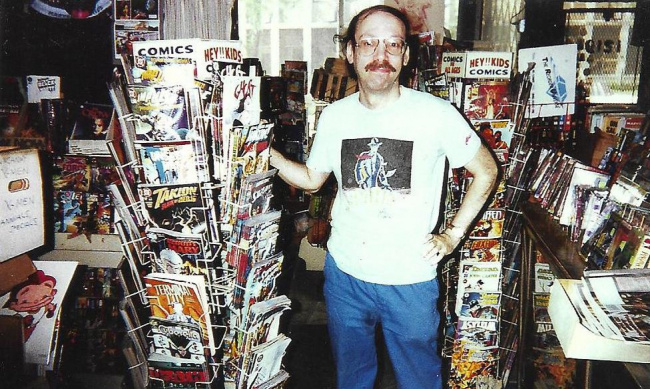
Early Chicago Comics Retailer, Co-Founder of Chicago Comicon
Posted by Brigid Alverson on December 27, 2023 @ 12:55 am CT
MORE COMICS
New 'Die' Story Out in November, Alongside 'Die Quickstart RPG Guide'
August 11, 2025
The Die: Loaded #1 will be released in November 2025, the same month as The Die RPG Quickstart Game Guide.
'Hama Files Editions' Will Include a Letter from the Creator
August 11, 2025
Each issue of the Hama Files Editions will include a letter from Hama with background information about the comic.
MORE NEWS
New Tank Battle Board Game by Smirk & Dagger
August 11, 2025
Smirk & Dagger will release Boom Patrol, a new tank battle board game, into retail.
New Weird Swashbuckling RPG
August 11, 2025
Magpie Games will release Rapscallion, a new weird swashbuckling RPG, into retail.



